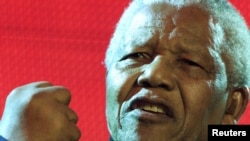The spokesman for South Africa’s ruling party has accused the United States of trying to “undermine” his country’s democratically elected government.
Yet representatives from both countries dismissed the comment and say the relationship between the two sides is strong.
The accusation came from African National Congress spokesman Zizi Kodwa. He spoke after publication of a story in Britain’s Sunday Times newspaper. The story said that, in 1962, the U.S. Central Intelligence Agency helped South Africa’s government arrest Nelson Mandela.
The newspaper published statements by a retired CIA officer, who is now dead. The former officer reportedly said the U.S. considered Mandela a supporter of communism.
Mandela spent 27 years in prison for his opposition to South Africa’s apartheid government and its racist policies. During this period, blacks and people from other racial groups did not have the same rights as whites. Under apartheid, whites were required to separate from other races.
Mandela was in prison from 1962 until 1990. He was elected South Africa’s first black president in 1994 after the end of apartheid rule.
ANC spokesman Zizi Kodwa said the CIA claim is “a serious indictment.” He added that the intelligence agency still operates in South Africa.
"We have recently observed that there are efforts to undermine the … ANC government," Kodwa told local media. "They [the C.I.A.] never stopped operating here.… It is still happening now. The C.I.A. is still [working] with those who want regime change."
Kodwa did not respond to numerous calls from VOA seeking comment on Monday.
‘Those are not our views’
But South Africa’s Foreign Ministry dismissed Kodwa’s earlier claims.
“Those are not our views,” government spokesman Clayson Monyela told VOA. “From government’s point of view, our relations with the United States are strong. They are warm and cordial,” he added.
The two nations are also major trading partners, with trade totaling about $21 billion, according to U.S. government reports.
That relationship was threatened last year when the U.S. and South African governments nearly failed to settle trade issues. The situation led President Barack Obama to threaten to stop South Africa’s membership in a U.S. trade agreement. That agreement lets South Africa export products to the U.S. duty-free.
In the past, the two nations have also traded strong words. In February, the secretary-general of the ANC accused the U.S. government of supporting a regime change. The U.S. ambassador to South Africa rejected the claim.
A U.S. Embassy official said the embassy has no information on reported CIA operations in South Africa in the 1960s.
I’m Ashley Thompson.
Anita Powell wrote this story for VOANews.com. Jim Dresbach adapted her report for Learning English. George Grow was the editor.
We want to hear from you. Write to us in the Comments Section or visit our Facebook page.
________________________________________________________________
Words in This Story
allegedly – adv. accused of having done something wrong or illegal but not yet proven guilty
communism – n. a way of organizing a society in which the government owns the things that are used to make and transport products such as land, oil, factories and ships and there is no privately-owned property
apartheid – n. a former social system in South Africa in which black people and people from other racial groups did not have the same political and economic rights as white people and were forced to live separately from white people
indictment – n. an expression or statement of strong disapproval
undermine – v. to make something weaker or less effective usually in a secret or gradual way
spokesman – n. someone who speaks for or represents a person or a company
cordial – adj. politely pleasant and friendly
duty-free – adj. selling goods that will not be taxed when taken into another country
regime – n. a form of government








